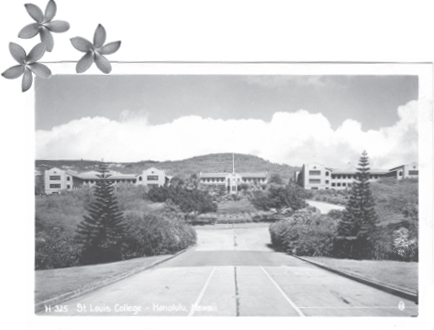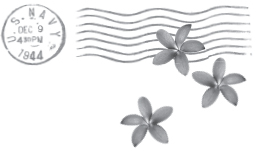

We saw the university campus too. It was really nice—lots of grass, which was something neat to see. Camp is all just dirt and tents.—February 9, 1945

The covered parking at Mr. Ed’s, a leftover from its A&W car-service days, was half full. Dad had started using a cane on and off. But even with age finally catching up to him, he never failed to pull the heavy door open for me or anyone else coming or going. We followed the same routine each week. Routine was comforting, I’d decided—it was something my father had realized long ago.
We sat at our favorite table, a booth next to the gas fireplace that was rarely going.
“Dad,” I said before our breakfast was served. “Can you explain exactly how you broke the Katakana code?”
“Well, sure,” he said without thinking. “Well, at least, I think I can.”
He’d hesitated for just a moment—long enough for me to predict that he was going to say he didn’t remember. But my prediction was wrong.
He unwrapped the paper ring around his napkin, then he folded the napkin carefully into a triangle next to his paper placemat. He lined up his silverware on the napkin, using the tips of his fingers to make the line perfect. I watched quietly as he took the four-color ink pen from his shirt pocket and began drawing letters and symbols on the placemat. His explanation quickly went over my head. But after many questions, he was able to explain it in a way I could understand—at least on a basic level.
In the small communications room aboard the submarine, my father sat at a desk with a Teletype in front of him and earphones on. His job was to copy the code, which meant that he listened and then typed. The Japanese language could be heard coming across in a form of Morse code. It was heard in pairs of letters and then a space and then another pair of letters. A combination would come in and my father would simply type the letters he heard. He got so that he could copy and type the code pretty fast. And in fact, to most people the code would have sounded like a very fast drumroll, with no distinguishable differences. But to someone who was trained, it sounded entirely different. Next, a long, thin strip of paper with small holes punched in it came out of an adapted Teletype machine. He would feed the paper into the machine of the cryptanalyst who sat next to him.
“And then, miraculously,” he added, “English would come out of the cryptanalyst’s machine. I was so close that I could lean over and see what it said. Sometimes it was about the movement of troops, but mostly it was about the movement of supplies.”
“But even the movement of troops could be critical, right?” I asked.
“I suppose so,” he said. “If a message said they were sending ten thousand Japanese troops to a certain island, that meant they were gearing up for battle. But we never knew what was important and what wasn’t. We just passed it on to our superior and he made those decisions.”
He thought for a bit, while he clicked his pen, adding details to his drawing in blue, red, green, and black.
“Even something as mundane as sending two thousand cans of beans, though, could mean something to someone who knew what to look for,” he said. “Like maybe it meant that a lot of troops were holed up in a certain place. Or maybe our guys knew that beans actually meant something else. I don’t know. It boggles the mind to think of all the ramifications. But we didn’t have to think of any of that. We just did our job.”
As I listened to my father, asked questions, and then listened some more, I realized that he simply did what he was trained to do. He didn’t try to analyze it. That wasn’t his job. He didn’t try to figure out what happened to the data he copied. And he didn’t try to figure out what his small part was in this enormous system. That would come many years later. But during the war, he just did as he was told.
What struck me even more so was that all of these years later, he seemed to be considering the importance of what he’d done during the war for the first time in his life. He had opened himself up enough to finally consider that what he did wasn’t just a job—it was critical. And yet, because of the secrecy he’d been sworn to, it was unsung. He’d sworn his oath of secrecy five decades ago, and by doing so, he’d silently agreed to never be recognized for what he did. My father and his team had gone their entire lives without a single person thanking them or recognizing them for their heroic contribution to the war.
My father was currently in his eighties. The rest of his team would now be that age too. I was suddenly hit by the realization that it was possible, even probable, that he was the sole survivor. His comrades may have all died by now—without any recognition for their wartime heroism. I hoped I could somehow change that for my father.

As I continued to read his letters, I could see a pattern that began during the war and continued to this day. My father had come back from Iwo Jima to Hawaii. He stepped off of the ship and somehow was able to put it all behind him. He compartmentalized the code breaking, leaving it with those who could be trusted. His letters highlighted this. He went back to Waikiki and to the life of every other sailor.
On liberty, he ate his way through Waikiki: ice cream, cheese sandwiches, chocolate cake, and even lobster. He wandered through town amongst his fellow servicemen, never speaking a word about what he really did.
March 12, 1945
Dear Folks,
Had a nice time yesterday but didn’t seem to enjoy it as much as last Sunday for some reason. The newness wore off I ’spose.
Didn’t get in town until about 10 and had a dish of ice cream & a cheese sandwich at U.S.O. then caught a station wagon out to the Methodist church and arrived a little late. Sat way up in the galley. Enjoyed it all tho, especially the choir (with civilians). I’m enclosing the program.
After that walked back to town in kind of a roundabout way thru a residential district. Enjoyed that too, as it was away from the hustle & bustle of the city itself. Then got a cab out to Waikiki and ate lunch at my favorite joint. Had lobster salad, iced tea and chocolate cake & ice cream. Then wandered around the Royal Hawaiian Hotel for a while & then caught a cab back to the main U.S.O. in Honolulu again.
Of course couldn’t get any mail yesterday so should have about 5 letters and the Chronicle Dispatch today. Have an hour yet to mail call time—I can hardly wait. It’s going to be terrible if I get aboard a ship and get mail only once a week or month or something. Then I’ll begin to appreciate the fast service I’m getting now. It will be the same your way too—so don’t be surprised if you don’t get any for two weeks or so. I’ll write often anyway—but then I’m not gone yet. Should get my glasses for sure this Friday and from then on no one knows what. Probably hang around to try ’em out and if they’re no good start all over. Personally it’s OK with me.
Well, haven’t read any good books or anything so dunno what else to gab about.
The radio is really a life-saver. We get really good programs all the time. Since I got my fonograph I hardly ever listen to any of the programs. Now I’m catching up again.
Also the foto album is swell company. Say, if you can—I mean if materials are still available—wish you would go thru some of those old negatives and find some I don’t have and have them printed & send to me. Pictures are almost next to being home even if they are old ones.
S’long for now. Write. Love, Murray
My father was back to his usual life. He walked around the base and around town, and nobody around him knew a thing. But he wasn’t the carefree sailor he’d been before. As he would tell me, the words of the sergeant often came to mind. No matter where he went, he knew that someone could be there to spy on him, watching to see if he’d reveal the military secrets he’d sworn to keep. And so he kept silent, and slowly began to bury the memories of what he’d done.